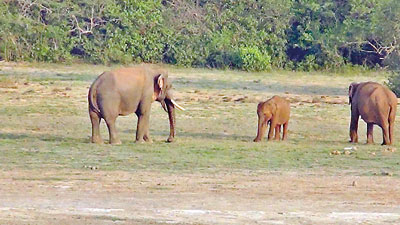News
What caused lonely death of Kallaru tusker?
View(s):The four-foot-long tusks seized by police this week belong to the “Kallaru tusker” that used to roam the Mullikulam forest in the Mannar region, whose death is yet a mystery.

The Kallaru tusker
The tusks belong to the skull and skeletal remains found on Friday at Silawatura in the Mullikulam wilderness, Department of Wildlife (DWC) officials said yesterday.
“Both tusks and bones belonged to an elephant that died one and half years ago. I determined that the tusks, which had been pulled out of the skull, were the same size of the bone sockets,” said DWC veterinary surgeon for the north-western region, Dr. Chandana Jayasinghe.
He is carrying out more tests to confirm this finding.
Dr. Jayasinghe believes the skeletal remains and the tusks belonged to one of four tuskers, including two smaller tuskers and a larger elephant, that roamed the Mullikulam forest.
Two years ago, the DWC had learned of an injured tusker exhibiting symptoms of weakness but had been unable to locate it, and Dr. Jayasinghe believes the remains found this week are of this elephant.
“I was unable to find gunshot damage in the skull or deformity in the molars and therefore am unable to state whether the elephant had been shot dead or had eaten a hakka-patas explosive,” he said yesterday. (Villagers sometimes place powerful crackers or explosives inside fruit so that elephants posing a possible threat to their farms would eat them and die from grievous injuries.)
DWC officials said three suspects arrested by Anuradhapura police on suspicion of seeking to sell the tusks have been remanded until next Friday.
The Assistant Director of Wildlife for the Anuradhapura region, W.A Sarath, said the DWC had begun the search for elephant remains following information received from the suspects.
Environmentalist Shashikalana Ratwatte said the Wildlife Department should step up conservation efforts and take action against the elephant tusk mafia.

